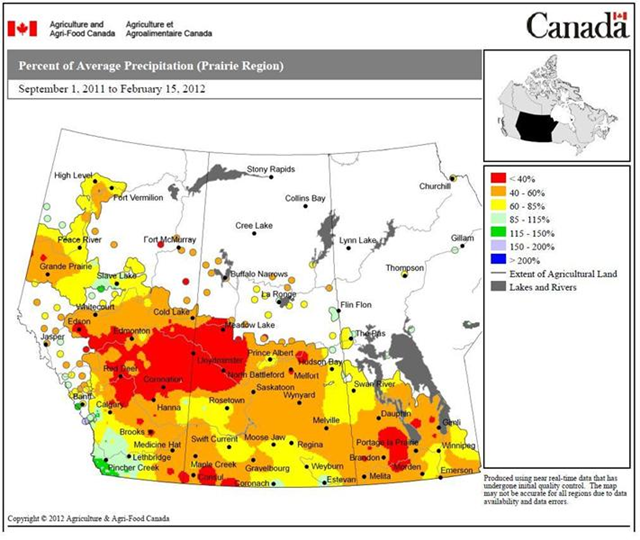Canada quietly pulls out of UN convention to combat drought, desertification – ‘We’re increasing our isolation by doing this’
By Steve Mertl
28 March 2013 (Daily Brew) – Whether you like it or not, Prime Minister Stephen Harper’s Conservative government is reshaping Canada’s relationship with the rest of the world. From last year’s withdrawal from the admittedly ineffectual Kyoto Protocol on climate change — which as CBC News noted will save the government $14 billion in penalties for missing its targets — to the disappearance of the Canadian International Development Agency (CIDA) as a stand-alone body, Ottawa seems to be abandoning the multilateralist approach that dominated its post-war foreign policy. Nowhere does that seem more evident than in its relationship with the United Nations. The government botched a bid to take one of the rotating seats on the UN Security Council in 2010. And its staunch support of Israel in the General Assembly contrasts with the more nuanced positions previous governments have taken in the thorny problem of Middle East peace. Now we learn that the Conservative government has quietly withdrawn from the UN’s convention to combat desertification, the only country in the world to do so. The Canadian Press discovered the cabinet made the decision last week on the recommendation of Foreign Affairs Minister John Baird. That was news to the UN secretariat that administers the convention, which only learned about it when a CP reporter called their office. Canada signed on to the convention in 1994 and ratified it the following year, along with 194 countries and the European Union, CP noted. It aims to find ways to prevent drought and the creeping encroachment of desert into farmland, especially in Africa. A meeting scheduled for April 9-19 in Bonn, Germany, will bring together scientists, officials and non-government groups to discuss the economic implications of desertification, land degradation and drought, according to a UN Environment Program notice. Now it looks like Canada won’t participate. CP reported the cabinet order “authorizes the Minister of Foreign Affairs to take the actions necessary to withdraw, on behalf of Canada, from the United Nations Convention to Combat Desertification, in those Countries Experiencing Severe Drought and/or Desertification, particularly in Africa.” The convention secretariat told CP no one from the Canadian government had contacted them about the withdrawal. Characteristically, the government was loathe to provide a public explanation. Baird’s office bounced CP‘s questions to CIDA, which in turn refused to comment. A spokesman for Julian Fantino, minister responsible for the agency that will soon be folded into the Department of Foreign Affairs and International Trade, said via email that “membership in this convention was costly for Canadians and showed few results, if any for the environment,” CP reported. No one would elaborate but CP found government documents showing Ottawa provided a $283,000 grant to support the convention from 2010 to 2012. Faced with an information vacuum, we’re left to speculate. Drought and desertification are thought to be made worse by the effects of climate change. The Conservatives are lukewarm at best on that issue, especially when it butts up against economic-development priorities such as oil sands extraction. The Harper government has been heavily criticized for apparently shifting policies to favour business over the environment. [more]
Canada quietly pulls out of UN convention to combat drought, desertification

Stephen Harper is a corporate whore. There is nothing good about the man, his policies or his leadership.
Expect nothing but more of the same.
The wages of sin is death. Maybe the Bible boys knew something. Supporting the fraud that man controls climate via co2 seems to have implications on a topic that is real and verifiable – loss of drinking water. By that I mean supporting a pack of lies does nothing for your credibility as a reliable authority. Have you watched Home – the Home Project on its own YouTube channel yet ?
As for the other I have noted so many articles a person has to willfully close their eyes not to know scientific consensus is unscientific balderdash. http://www.climategate.com/
opit – you're a dumb as a stump. The fraud is the book your reading.
Try reading some real science. Start here: http://www.skepticalscience.com/argument.php?f=percentage
Please, let's keep the dialog polite! –Des
I might be 'dumb as a stump' but I am not mute – nor do I hide my identity nor cite a cartoonist ! In fact, I note in the past week things have changed from futile assessments that futurecasting is impossible to positive assertion we are on the downward swing of the climate cycle : 16 years out of at least 25. http://my.opera.com/nepmak2000/blog/2013/03/04/geo-engineering-do-we-see-weather-warfare-or-dont-we
Dr. John v. Kampennepmak2000 # Wednesday, March 27, 2013 4:21:55 PM
I continue to witness a decline in solar output, hence less 'warming' of the oceans that are our heat-tanks. We had hurricanes at the pole that shifted ice around, undersea volcanoes working under the Arctic etc. What I do know is that our planet is cooling. And for some time already. A natural cycle to my opinion. Whether the Gulf stream has to do with this is uncertain and cause of controversies. http://iceagenow.info/
http://www.landscheidt.info/?q=node/218 The real controversy…
http://youtu.be/l2JvbnxM_mc Anything 'new' here? See date…
http://youtu.be/mrDVoSuD_iI Any questions…?
wink rolleyes coffee coffee coffee coffee